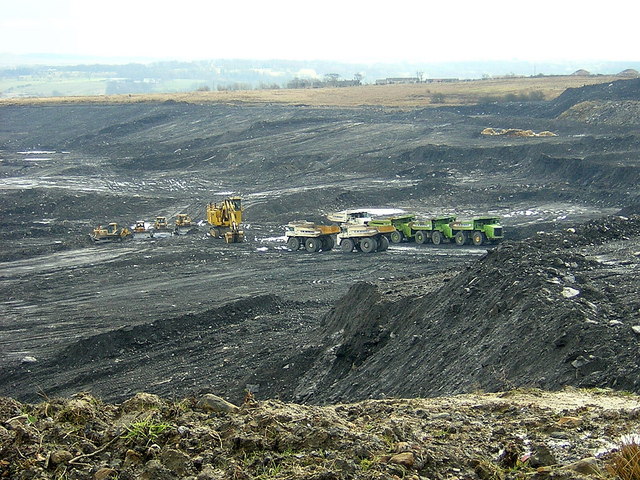Coal usage for electricity generation to end by October 2024
|
This photograph shows the Opencast coal mine near Plains, Scotland. |
Contents |
[edit] Introduction
On 30 June 2021, Energy and Climate Change Minister Anne-Marie Trevelyan announced that as of 1 October 2024, Great Britain will no longer use coal to generate electricity.
The policy change brings the deadline forward by one year and is part of the Government’s plans to transition away from fossil fuels and decarbonise the power sector. It will not apply to non-electricity generating coal consumers, such as the steel industry, nor to domestic coal mines.
[edit] Background
Coal is considered to be one of the most carbon intensive fossil fuels and is responsible for the creation of harmful air pollution. By eliminating the use of coal in electricity generation, the UK hopes to play a role in limiting the global temperature increase to 1.5 degrees.
On 18 September 2017, following a consultation in November 2016, the Government confirmed that it would proceed with action to regulate for the closure of unabated coal power generation units in Great Britain by 1 October 2025. On 4 February 2020, the Prime Minister announced the Government’s intention to bring forward the deadline for phasing out unabated coal generation to 1 October 2024.
The Government ran a consultation from 14 December 2020 to 26 February 2021 seeking views on proposals to achieve this objective. The analysis found that setting a closure date of either 2025 or 2024 would most likely not have a significant impact on the UK coal mining sector predominantly due to the fact that coal mining in the UK has already been in decline in recent years.
In March 2021, coal-fired power plants did not participate in the four-year ahead Capacity Market auction. The auction secures the electricity capacity Great Britain needs to cope with peaks in demand in 2024 - 2025. Coal power plants will not participate in any future Capacity Market auctions due to the introduction of Emissions Limits to the Market.
[edit] Transitioning away from coal
The UK has reduced the use of coal across the power sector, with coal accounting for only 1.8% of the electricity mix in 2020, compared with 40% almost a decade ago. Ending unabated coal generation in 2024 will mean the country will have reduced coal usage from almost a third of its electricity supply in 2014 to zero in 2024.
In 2020, the UK went 5,000 hours without coal-fired electricity. During that period, the country generated 43.1% of its electricity from renewable sources including wind (24.2%), bioenergy (12.6%), solar (4.2%) and hydro (2.2%). Coal only consisted of 1.8 % of the year’s electricity generation, and nuclear generation made up a further 16.1%.
In early 2021, the country broke a new wind power record, with just over a third of the country’s energy coming from wind.
The rise in the use of renewables - thanks to competition, free enterprise and government incentives to kick start new technologies - has in turn helped to drive down the cost of green energy, with coal power now more expensive in most countries.
[edit] Related articles on Designing Buildings Wiki
Featured articles and news
UK Infrastructure: A 10 Year Strategy. In brief with reactions
With the National Infrastructure and Service Transformation Authority (NISTA).
Ebenezer Howard: inventor of the garden city. Book review.
The Grenfell Tower fire, eight years on
A time to pause and reflect as Dubai tower block fire reported just before anniversary.
Airtightness Topic Guide BSRIA TG 27/2025
Explaining the basics of airtightness, what it is, why it's important, when it's required and how it's carried out.
Construction contract awards hit lowest point of 2025
Plummeting for second consecutive month, intensifying concerns for housing and infrastructure goals.
Understanding Mental Health in the Built Environment 2025
Examining the state of mental health in construction, shedding light on levels of stress, anxiety and depression.
The benefits of engaging with insulation manufacturers
When considering ground floor constructions.
Lighting Industry endorses Blueprint for Electrification
The Lighting Industry Association fully supports the ECA Blueprint as a timely, urgent call to action.
BSRIA Sentinel Clerk of Works Training Case Study
Strengthening expertise to enhance service delivery with integrated cutting-edge industry knowledge.
Impact report from the Supply Chain Sustainability School
Free sustainability skills, training and support delivered to thousands of UK companies to help cut carbon.
The Building Safety Forum at the Installershow 2025
With speakers confirmed for 24 June as part of Building Safety Week.
The UK’s largest air pollution campaign.
Future Homes Standard, now includes solar, but what else?
Will the new standard, due to in the Autumn, go far enough in terms of performance ?
BSRIA Briefing: Cleaner Air, Better tomorrow
A look back at issues relating to inside and outside air quality, discussed during the BSRIA briefing in 2023.
Restoring Abbotsford's hothouse
Bringing the writer Walter Scott's garden to life.
Reflections on the spending review with CIAT.
Retired firefighter cycles world to raise Grenfell funds
Leaving on 14 June 2025 Stephen will raise money for youth and schools through the Grenfell Foundation.
Key points for construction at a glance with industry reactions.
























